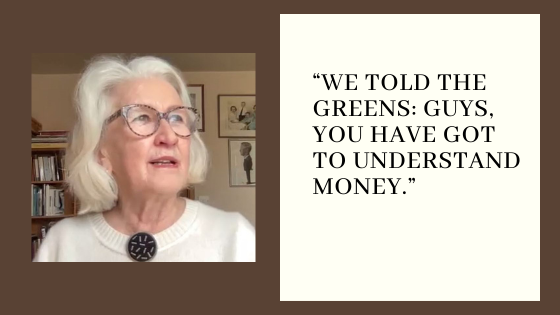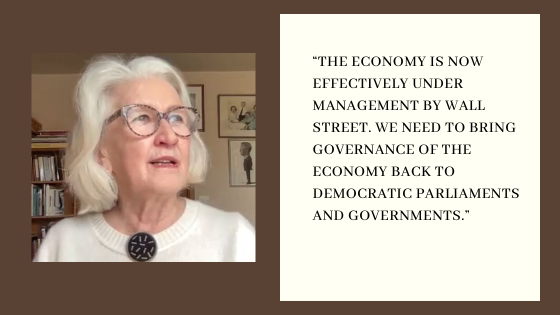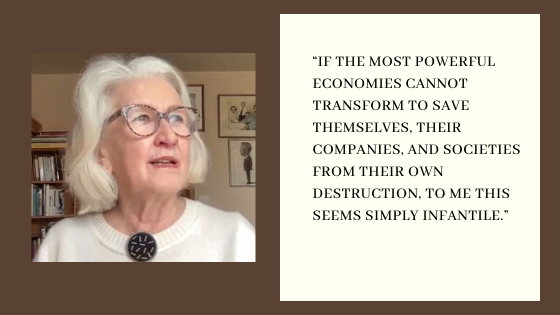The Case for Growing our Own Beans
Posted on 22 Jun 2021 Categories: Blog, Climate crisis, Cross-posts, New economic models
by Anna Tervahartiala
As the pandemic has stood the world on its head, one of the debates which has been thrown wide open is that of the future of the economy. PSJP has launched an inquiry into how markets can be made to work for the common good and how economies can be made to serve the general interest, rather than that of the few. The first step has been a series of conversations with people who are working towards an economy for the common good. Read the first conversation here.
Ann Pettifor is a pioneer in analyzing monetary policy through the lens of justice. In this article, she has three main messages for philanthropy, governments, investors and economists. The first message is that we all need to understand what money actually is and the role it plays in our economies. The second is to note who today is running our economy and towards what purpose? Do the private sector interests now in charge have our best interests in mind? The third is to differentiate between a future economy based on rent-seeking where gains are made effortlessly from existing assets or one that is characterized by public and private investments for improving infrastructure, creating new green assets, employment and productivity. Only the latter will result in markets for the common good.
An interview with Ann Pettifor
Ann Pettifor has spent decades untangling the complexities of monetary and financial systems. She brings a rare and much-needed justice lens to monetary policy and high finance.
“In the beginning of the 2000s, we said that the whole system will blow up soon because there is so much private and public debt relative to income. We were mocked,” she says. Born in South Africa, trained as an economist, with an impressive track record in political advisory roles, and a long list of publications to make her case, Pettifor was the co-founder and leading voice of the Jubilee 2000 movement which led to the cancellation of $100 billion of debt owed by 35 low-income countries at the turn of the millennium. But Pettifor was just getting started. Her work has continued to set precedents in our global discourse on economics, justice, the environment and the role of money. Her prescient warning about the need to develop economic solutions to address the unfolding climate crisis, is now mainstream and is making decision-makers feel the heat across the political spectrum.
“By 2007, I had joined a group of environmentalists and economists who had started to work on a report on the transformation of the economy to tackle the climate breakdown. We titled our report the Green New Deal. By then, the term had been in use in the United States, but mainly to promote technology for green energy solutions and digitalisation,” Pettifor notes.
The Green New Deal crafted by Pettifor’s group went beyond technical questions. The group set their sights on systemic reform.
“We told the greens: guys, you have got to understand money.”

Talking about money is not enough – we need to understand it
The crux of the issue is clear: the world is governed by money but many, including economists, do not understand the nature of money, or how it originates. This failure has created a monetary and a financial system as well as a banking sector that does not serve the interests of the public. Quite the contrary – the system at large serves the interests of wealth and the owners of wealth.
“Commercial banks create money ‘out of thin air’ each time they make a loan. Loans create deposits and not the other way around,” Pettifor explains. This is the system of credit that has evolved over time, a system that enables society to operate in the way it does. (It would also enable us to afford the transformation needed to end our addiction to fossil fuels). It is a system based in turn on a social construct: the promise to repay. The word derives from the Latin word credo, which means I believe. In other words, banks operate on the basis of trust – the promise and assumption that the debtor will pay back the loan. To uphold trust, requires regulation, the enforcement of contracts and the law – and regulation is something the holders of money, of capital, resist.
Pettifor explains, however, that the system is changing. Today’s globalised corporations do not work through high street (or ‘main street’) commercial banks. Take the asset management company, Blackrock, with more than 8.6 trillion dollars of the world’s savings under management. Blackrock’s clients range from pension funds, insurance companies and charities to central banks. This means that whether directly or indirectly, millions of people have a stake in Blackrock.
“You cannot put 8.6 trillion dollars in a high street bank because it is very risky for an institution like Blackrock. The government only guarantees a fraction of those sums. What financial corporations do instead is to use the ‘shadow banking’ system to transform that cash into low-risk assets or collateral. This follows the logic of the antiquated gold standard system,” says Pettifor.
This new system of money creation operates beyond democratic regulation. In practice, the shadow banking system is like a giant pawnbroker. Those companies that hold cash (savings) lend to companies that need to borrow cash, and do so by exchanging cash for an asset (collateral). These are often the bonds of OECD states, such as US Treasury Bills or European Central Bank Bonds. Such shadow banking activities involve trillions of dollars of the world’s savings.
“Because of the globalised, vast, and unregulated system of shadow banking, we do not understand the risks that companies like Blackrock take. If the value of the collateral swapped for cash were to fall, the value of the world’s savings could be jeopardised,” Pettifor explains.
The growth and impact of the shadow banking sector led to the financial meltdown of 2007-9 – a meltdown that Pettifor saw coming. In light of the lack of systemic change, she has been warning of the sequel for years.
Even if change has not happened so far, it does not mean that change is impossible. Far from it.
“People forget that all private institutions function with taxpayers’ – public – support. Government bonds, or public debt, for example, only have value because taxpayers pay their taxes into the government treasury every year. The private financial system relies heavily on those government bonds (debt) as safe assets or collateral, which can be used to leverage additional borrowing, much as a property owner may use the current value of their home to leverage additional borrowing.” Pettifor says.
Despite its reliance on taxpayers, the private finance sector – shadow banking included – has pushed governments out of the driver’s ‘regulatory’ seat, or, in some cases, to Pettifor’s alarm, governments are handing the keys to their financial vehicles (assets) voluntarily.
To explain what she means, Pettifor offers a recent example from the first press conference of the United States Climate Envoy John Kerry. In the press conference held in January 2021, Kerry and Climate Advisor Gina McCarthy presented the much-anticipated climate plan aiming to curb the impacts of the climate crisis, deliver environmental justice and create jobs as it does so.
“In his speech, Kerry called on asset managers and investors, actors like Blackrock, to seize the investment opportunities posed by the climate crisis. McCarthy went even further and said that the question would not be whether the private sector would buy into the deal. The private sector is to drive it,” Pettifor recounts.

“The problem is that the private sector, Blackrock included, has not been designed to save us from the climate breakdown. Blackrock’s shareholders do not care about the environment. They care about making capital gains for shareholders. If we assume that the markets can drive the Green New Deal while profiting from it, there will be nothing new nor green about the Deal.”
This is a question of the well-being of the people and the planet, Pettifor notes. If tackling the environmental crisis is a sincere goal, then environmentalists, scientists and taxpayers need to be driving the Deal.
“The economy is now effectively under management by Wall Street. We need to bring governance of the economy back to democratic parliaments and governments.”
Rent-seeking limits the impact potential of next gen enterprises
On the other side of the Green New Deal coin is the wave of next generation social businesses, entrepreneurs and investors setting sustainability at the core of their operations right from the get-go. These actors are following the money and making claims for responsible growth going beyond business as usual.
The trend is needed but, for Pettifor, it’s not a solution.
“You cannot start anything new without money. And it is increasingly difficult for entrepreneurs to make money by creating new assets or enterprises. Instead, in today’s new rentier economy, capitalists increasingly make money by generating rent from existing assets,” Pettifor says. These rent-creating revenues range from rents on intangibles like apps, intellectual property (eg, Microsoft or Apple software) as well as on existing assets like London, or New York or Berlin properties.
To elaborate on the role played by intellectual property, Pettifor gives an example from a recent visit to an orange farm in South Africa. A region once characterised by diverse landscapes had been transformed into fields of monoculture. Farmers who had built their livelihoods on orange farming were finding it increasingly difficult to make ends meet. The reason for these difficulties was the move from ownership to renting.
Not long ago, farmers had grown oranges on fields and trees they owned. Subsequently, they have been persuaded to rent the rootstock of orange trees from multinational corporations. These rootstocks are protected by public regulation – intellectual property law that enforces the prices of the asset rented out. In addition to the rent paid for the use rootstocks, farmers are obliged to pay a set amount of profit from their yields. In essence, those farmers had become tenants and contractors on their own farms.
“Traditional investors expect a return of four to six per cent each year. For farmers to provide this, they need to grow more oranges, make their labourers work longer hours, and drain water resources more and more every year,” Pettifor elaborates.
“In order to keep up with the rate of rent-seeking, we need to increasingly exploit the land, fish the seas, and cut down the forests – to generate the high rates of return expected.”
As long as the corporate need for these rates of return remains the same, enterprises will be structurally, ecologically and economically unsustainable.
Change, not changes
The problems are clear, yet the question of how to flip the system remains. Incremental changes might buy time, but do not provide durable solutions. Many economists, Pettifor included, hoped and believed that the Covid crisis would lead to a push for systemic, transformational change − for the financial system and the ecosystem.
Unfortunately, recent developments are making it clear that the push was not strong enough. According to a report published by Oxfam earlier this year, the world’s richest individuals recovered the wealth they lost in the initial Covid crash within a year. On the other hand, it will take more than a decade for the world’s poorest to recover from the setback. As we watch stock markets rise and fall as they did before, it is becoming increasingly clear that the “new normal” is not so different from the old one.
According to Pettifor, the question circles back to understanding money and power.
“We need to understand the power of our own public institutions. Big players go to publicly owned central banks to cover their risks, utilize currencies, and harness the social construct of money to make capital gains,” Pettifor says. These institutions cover their risks with the aid of taxes paid by millions each year that render banks and government-issued bonds valuable.
Despite complexities and inertia, Pettifor sees hope in the ongoing debate regarding the EU’s Action Plan for Financing Sustainable growth – most notably the linked taxonomy differentiating sustainable or green financial products from non-sustainable or brown products.
“The taxonomy (or classification) will enable the European Central Bank to argue that they will not accept on to their balance sheets a given corporate bond because the activity behind the bond is deemed harmful. Because the central bank plays such an important role in the economy, and because companies want to access central bank resources, for example Quantitative Easing (QE), this leads to a huge power shift away from, for example, fossil fuel investments.”
Yet, though the sustainability argument is clear, resistance and lobbying against a rigorous and sound taxonomy remain intense. Pettifor has little patience with this.
“If the most powerful economies cannot transform to save themselves, their companies, and societies from their own destruction, to me this seems simply infantile,” Pettifor begins.
“Whenever a government plans to invest in sustainable change, Wall Street will flag the threat of inflation. Yet the threat of inflation, even if it is a real threat, does not compare to that of climate catastrophe. The fact is, central banks have the power to create the needed cash that enable governments to do what they need to do. If we were at war, there would be no question about providing the finance needed to enable a government to defend the security of its people.”
Having said this, Pettifor notes that the only way to flip the system is to move from an investor-led economy to an employment-led economy. Governments need to invest in employment in order to get their economies back to equilibrium.
“A sustainable economy is a labour-intensive economy. Pandemics will not end here and the next one will be bigger than this one. If an economy is to make it through the next one, it needs to be a service-based economy,” Pettifor says. The time for making more gadgets and focusing on growth through extraction is past.
“We need to start growing our own green beans. We can no longer expect a company in Kenya to drain their water resources, exploit local cheap labour, and fly the beans to us 365 days a year,” she concludes.
For more information on Agriculture, IP rights and technological fixes:
https://www.annpettifor.com/2021/05/bill-gates-save-the-jetset/
Anna Tervahartiala is a communications and media professional with a background in sustainable finance, the humanitarian sector, and peacebuilding.
This was originally posted on the PSJP blog on 10 June 2021.
Posted on 22 Jun 2021 Categories: Blog, Climate crisis, Cross-posts, New economic models

